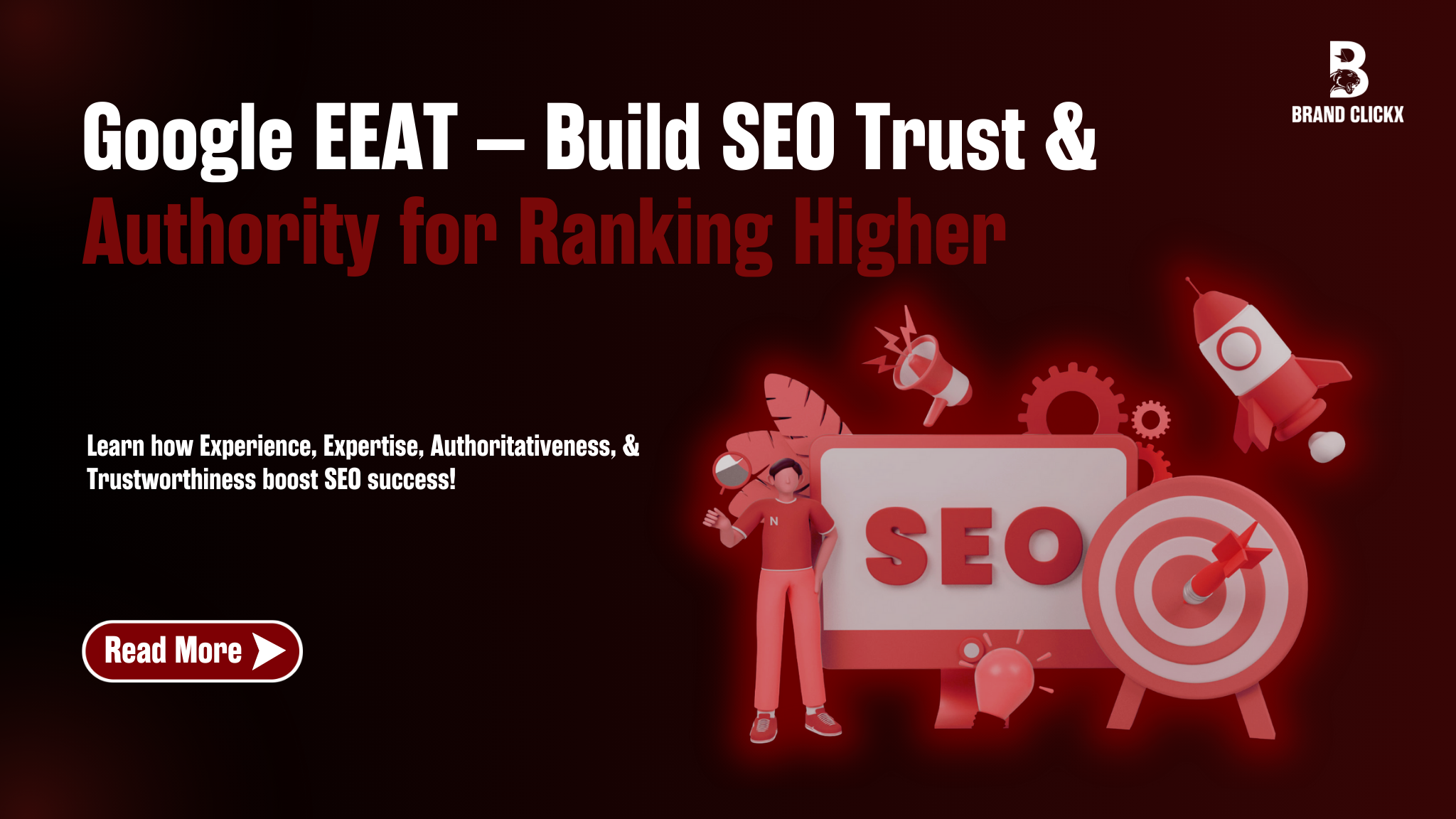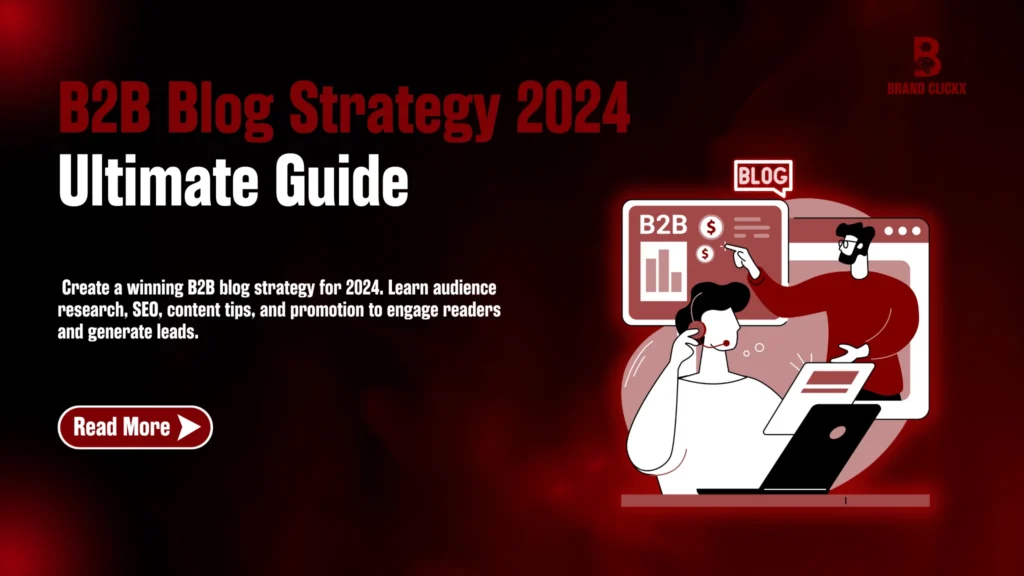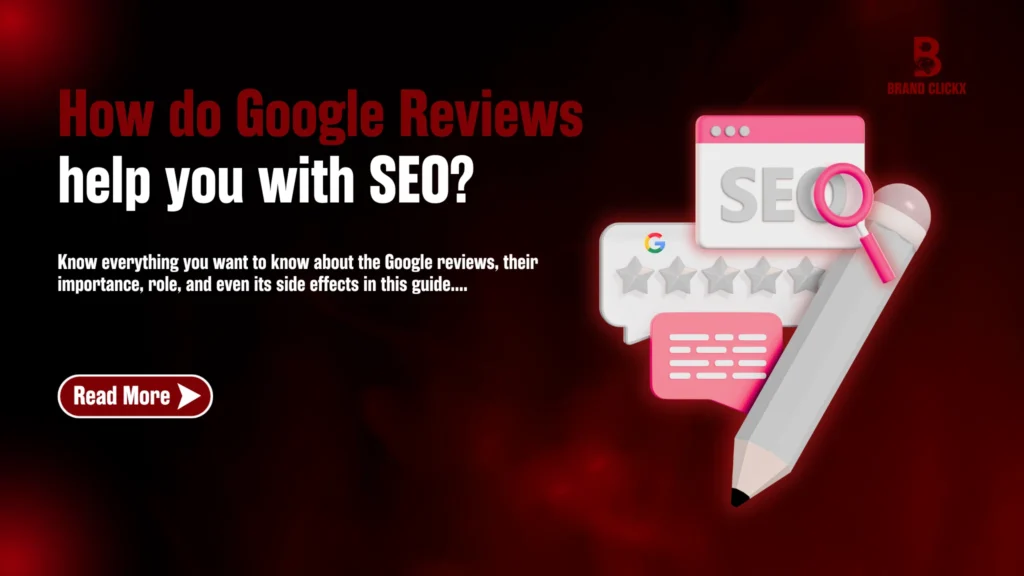Want to rank higher and win Google’s trust? Then you need to master Google EEAT – Build SEO Trust & Authority.
EEAT is not just another SEO buzzword! It’s how Google decides who to trust and who to rank.
Think about it. Would you take medical advice from a random blogger or a certified doctor? Exactly! Google works the same way.
Google doesn’t just look at keywords – it looks at credibility. It wants content from real experts who are backed by experience and trusted by users. If your site lacks EEAT, you’ll struggle to rank, no matter how good your SEO is.
- E-Experience
- E-Expertise
- A-Authoritativeness
- T-Trustworthiness
So, how do you build SEO trust and authority? Simple. Prove your expertise, show real experience, and earn credibility. Want to know more about EEAT? Keep Reading!
What is Google EEAT?
EEAT stands for Experience, Expertise, Authoritativeness, and Trustworthiness. These four factors separate high-quality content from the rest.
If your website nails EEAT, you have a better shot at ranking higher. If not, you might get lost in the crowd.
1. Experience – Real-World Knowledge Wins
Google loves content from people who’ve been there and done that. It favours firsthand knowledge over generic, rewritten fluff.
- A tech review from someone who’s used the product beats a random summary.
- A fitness guide from a personal trainer holds more weight than a vague article.
- A travel blog with personal photos and experiences ranks better than a list copied from Google.
Want to impress Google? Share real experiences, case studies, and hands-on insights. This is how Google will consider your content as coming from an experienced being.
2. Expertise – Be the Go-To Source
Google wants experts, not amateurs. If you’re giving advice, you need proof you know your stuff.
- Medical content? Doctors and health professionals rank higher.
- SEO strategies? Industry pros beat random bloggers.
Show your expertise with credentials, qualifications, and deep knowledge. The more authoritative you are, the better your chances of ranking.
3. Authoritativeness – Build Your Reputation
Being an expert is great. But being recognized as an expert is even better. Google measures authority by how well-known and trusted your content is.
The goal? Become the go-to source in your field. Make people (and Google) see you as a leader.
4. Trustworthiness – Be Transparent & Reliable
Trust is everything. If Google doesn’t trust your site, it won’t rank you. Simple as that. The more reliable and transparent your content is, the more trust you build—from both Google and your audience.
Why EEAT Matters for SEO?
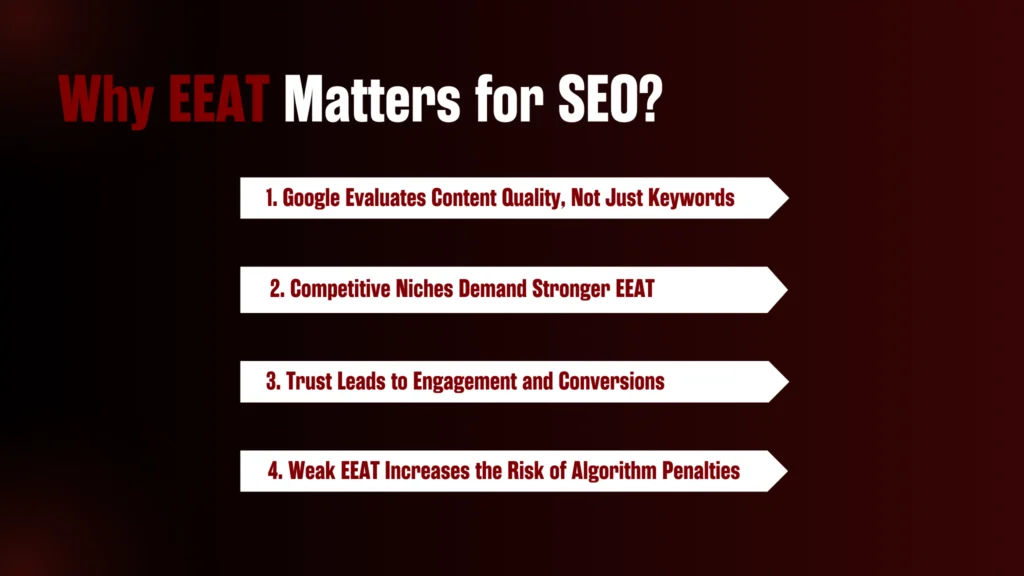
1. Google Evaluates Content Quality, Not Just Keywords
Gone are the days when stuffing keywords was enough. Google now looks for well-researched, experience-backed content.
If your article doesn’t demonstrate real expertise, it won’t make the cut. High-ranking content is written by trusted professionals, not faceless websites.
2. Competitive Niches Demand Stronger EEAT
In high-stakes industries like finance, health, and law, expertise matters. Google prioritizes sources that have certified knowledge and industry recognition.
A financial blog by a CFA will always outrank a hobbyist’s advice. If your competitors invest in EEAT and you don’t, you’ll fall behind.
3. Trust Leads to Engagement and Conversions
Users don’t just want answers—they want reliable answers. When they trust your content, they stay longer, explore your site, and even convert into customers.
A well-researched, transparent article builds loyalty, making visitors return instead of bouncing to competitors.
4. Weak EEAT Increases the Risk of Algorithm Penalties
If your website lacks EEAT, it’s vulnerable to ranking drops. Sites with strong authority, transparency, and credibility remain stable, even after major algorithm shifts.
EEAT isn’t just about ranking higher—it’s about staying relevant and trusted. Without it, you risk being ignored by Google and your audience.
How to Build EEAT for SEO Success
Now that you know what EEAT is, it’s time to put it into action. Google EEAT isn’t just about theory! It’s about proving your credibility.
Here’s how to build EEAT the right way.
1. Enhancing Experience – Show You’ve Been There
Google values firsthand knowledge. It wants content from people who have actually done what they talk about.
Share Real-Life Experiences
A personal finance blog written by someone who’s paid off debt is more trustworthy than generic money tips.
For instance, A personal finance blog like NerdWallet ranks high because it provides real-world financial advice with data-driven insights. Similarly, Backlinko by Brian Dean ranks because he shares SEO strategies he’s personally tested.
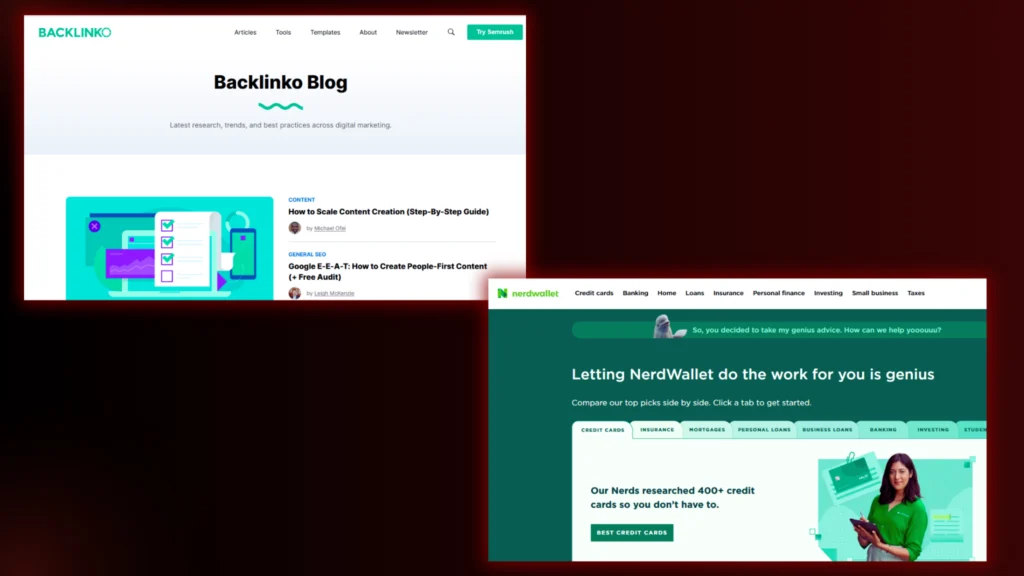
Use Case Studies
Google trusts brands that show real results with data and proof. For example, a digital marketing agency shared a case study on how they increased traffic by 300%.
Add Author Bios
Google ranks content higher when it knows who wrote it. Show off your background, certifications, and experience.
Write in First-Person
Instead of sounding robotic, make it personal. “I tried this strategy, and here’s what happened” builds trust.
2. Demonstrating Expertise – Be the Real Deal
Google doesn’t want guesses. It wants well-researched, accurate content from people who know what they’re talking about.
Publish Fact-Checked, In-Depth Content
Google prioritizes content that is thorough, reliable and fact-checked. A healthcare article written by a certified doctor will always outrank one from a random blogger. That’s why sites like WebMD, Healthline, and others dominate medical search results.
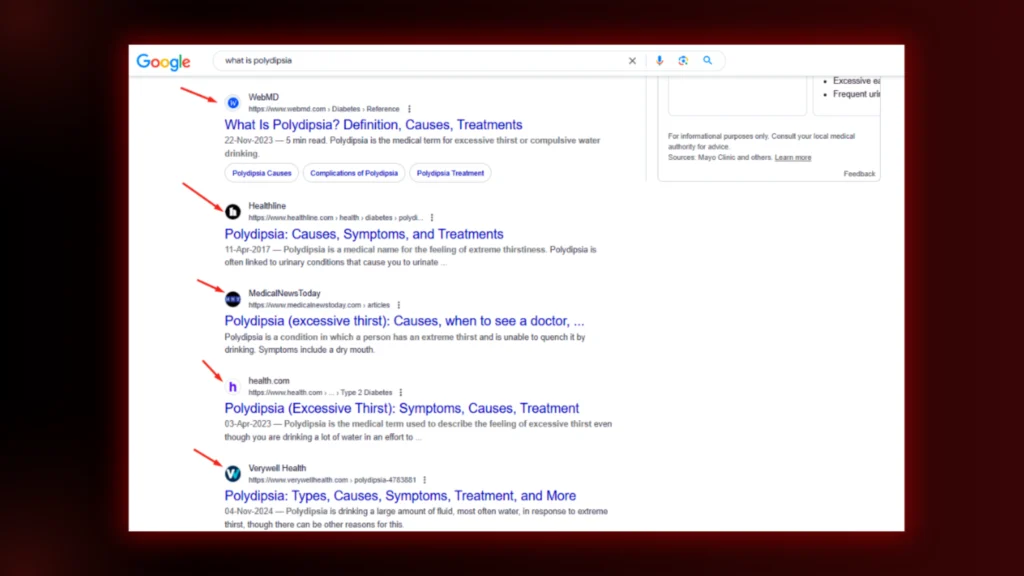
Likewise, legal advice from an actual lawyer holds more weight than a generic blog post. If you want to rank, don’t guess—prove your expertise with facts and real-world insights.
Cite Reputable Sources
Google ranks content that is backed by trustworthy references.
- Government websites (CDC, FDA, IRS) are gold standards. If you’re writing about health, finance, or law, citing these sources boosts credibility.
- Universities and research institutions like Harvard Business Review, MIT, and WHO add weight to your claims. A study from Harvard carries more trust than a random survey.
If you want your content to rank, link to trusted sources, not just opinions.
Update Your Content – Stay Fresh
Google doesn’t rank outdated content. It wants fresh, accurate, and up-to-date information.
Tech blogs like Search Engine Journal and Moz update their SEO guides regularly. That’s why they stay at the top.
Google rewards sites that keep content fresh, accurate, and in line with the latest industry standards.
Read Blog Posts:
- 9 Tips for Writing Landing Page Copy That Converts
- How to Write Engaging Content in 6 Easy Ways (2025)
3. Strengthening Authority – Become the Go-To Source
It’s not enough to be an expert. You need others to recognize it, too. Google looks at how respected you are in your industry.
- Earn backlinks from high-authority sites. If Forbes, HubSpot, or TechCrunch link to your content, Google sees you as trustworthy.
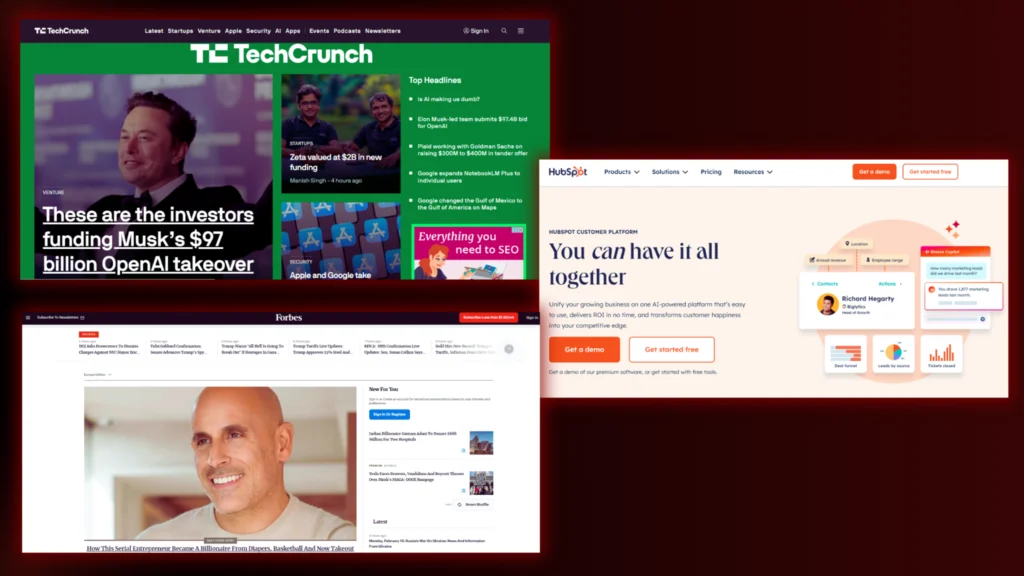
- Get mentioned in news and industry blogs. Being quoted in major publications shows Google that experts trust you.
- Build a strong social media presence. Google notices engagement. If your content is widely shared, liked, and discussed, it signals authority.
4. Boosting Trustworthiness – Be Open & Secure
When you apply EEAT strategies, you not only improve rankings but also win user trust. Some of the trust-boosting strategies are as follows:
- Use HTTPS to keep your site secure.
- Cite your sources and fact-check everything.
- Show clear author bios and contact info—no hidden identities.
- Disclose affiliate links and sponsorships to stay transparent.
FAQs
1. What is the Google E-E-A-T concept?
Google E-E-A-T stands for:
- Experience
- Expertise
- Authoritativeness
- Trustworthiness
It helps Google determine the credibility and quality of content. Websites with strong E-E-A-T have better chances of ranking higher.
2. What does E-E-A-T mean in SEO?
In SEO, E-E-A-T is a guideline that ensures content is:
- Reliable
- Well-researched
- Created by experts
Google uses it to rank pages, especially in sensitive topics like health, finance, and law.
3. What is Google’s E-E-A-T ranking factor?
E-E-A-T is not a direct ranking factor but plays a big role in SEO. Google assesses content quality through author credibility, user trust, and experience. Websites with strong E-E-A-T gain higher rankings.
4. What are the benefits of E-E-A-T?
- Higher rankings – Improves visibility on Google.
- More trust – Users prefer credible sources.
- Better engagement – Quality content keeps visitors interested.
- Lower penalty risk – Google favours trustworthy sites.
- Stronger reputation – Boosts brand authority.
Final Tips for EEAT Optimization
- Create with purpose – Share real experiences and valuable insights that truly help your audience.
- Be trustworthy – Back up your content with facts, transparency, and a genuine voice.
- Stay ahead – Keep learning and adapting as Google’s SEO rules evolve.
If you need high-quality content that follows EEAT principles for your website or blog, contact the experts at Brand ClickX today!

